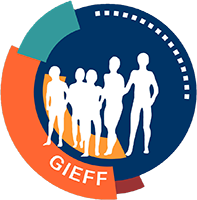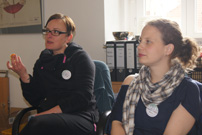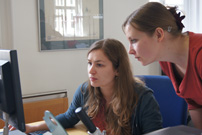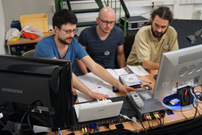Report on the 11th Göttingen International Ethnographic Film Festival
May 9th - May 13th, 2012
The festival is organised by an association, founded in May 2007.
The festival takes place in the heart of Göttingen.
The festival is founding member of CAFFE - Coordinating Anthropological Film Festivals in Europe.
The Festival Programme was composed by an international selection committee, including former and new members. More than 440 films had been submitted. 52 films were selected, 23 for screenings in the student film category, 29 for the main festival..
As every year, the student film competition was of special interest and many commented on the very good quality of the films. Beside the presentation of new productions the festival had three main topics: "Coping with Crisis", "Migration and the consequences", and "Participatory - What Does it Mean?".
Following the festival the symposium "Participatory - What Does It Mean? Participatory Cinema, Participaotry Video Under Consideration" took place.
The Student Award was sponsered by Litfin-Stiftung and went to the film:
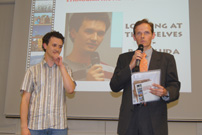
Looking at Themselves - Babaluda Luda
by Mihai Andrei Leaha, Romanian 2011
The protagonists of a documentary are recorded while watching their shared ethnographic experience. The feedback provided by these people supports the understanding of the ethnographic representation. The film attempts to question the ways in which the visual narrative is constructed when using the feedback method. Special focus is put on the Babaluda Feast in Romania and its visual ethnographic representation. The use of the chronotopic montage technique by Bakhtin helps to construct a concurrent unity of time and space. Thus, it creates an illusion of watching the film together with its participants.
Two Recommendations were given to the films:

My Kosher Shifts
byIris Zaki, Israeli 2011
In the heart of Golder’s Green, North London, one finds a small orthodox Jewish hotel. You do not have to be circumcised to get a room, but why would anyone of his own free will want a Kosher breakfast? Iris, the receptionist, started working there two years ago, in addition to her Master studies in documentary filmmaking. As a Tel-Aviv atheist celebrating a wild lifestyle she represents more or less the opposite of the typical clientele. Far away from Israel, with all its political and social tensions, Iris is responsible for her customers' comfort and talks to them about God, religion, life and love. A quirky personal perspective on the Jewish orthodox world through the window of the reception desk.
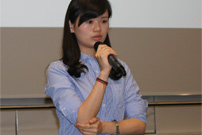
I Filming...
by Li Jun, Chinese 2010
As a student in film and video, I focused on documentary filmmaking. When I prepared my graduation thesis, something puzzled me: What have I learned from these four years studying? The ten girls of my anthropology postgraduate course and I have learned documentary filmmaking for four months in 2010, and in November I filmed their whole documentary filmmaking process at the Stone Forest in Yunnan. I was trying to find out how they would do it and what differences there might be for me. However, looking for answer was no longer important when I was coming to the end of my accomplishment. The point is that the experience and the reflection about myself from time to time is what I’m rewarded with.
The Centro Incontri Umani Award went to to the film:
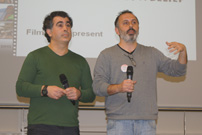
The Well – Water Voices from Ethiopia
by Mario Michelini, Riccardo Russo, Paolo Barberi, Italian 2011
The Horn of Africa is a region of the world which periodically faces terrible droughts. Each year when the drought reaches the dry Oromia lowlands in the south of Ethiopia, the Borana herders gather with their livestock around their deeply dug wells. With its strong photography and its epic narrative style, the film follows the people's daily lives during the entire time of a dry season. It shows a unique traditional water management system that allows to manage the small amount of water as the property and right of everyone without any exchange of money.
Meeting point Göttingen International Ethnographic Film Festival
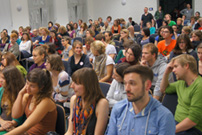
International as always
52 films produced by filmmakers from 28 countries telling stories about people in 38 countries were screened.
250 permanent guests from 25 countries, from all over Europe, but also from Australia,Brazil, Cambodia, China, India, Indonesia, Japan, Myanmar, New Zealand, and USA visited the festival.
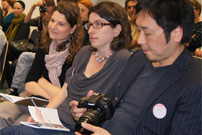
The jury had a difficult task
Never before we had a jury working so hard.
Marleen Folkerts (The Netherlands), Michaela Schäuble (Germany), and Itsushi Kawase (Japan) were discussing intensively. There were so many good films, of very high standard, as the jury found, so the decision was not easily be made.
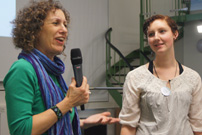
Many filmmakers came and discussed their film with the audience
Anneta Papathanassiou as many other filmmakers were discussing with the audience after the screenings or later in the cafeteria.
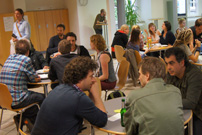
Filmmakers as visitors used the opportunity to chat in the cafeteria
Students from 15 different universities were eager to know more about the topic of the film and filmmaking itself.
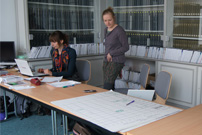
Students from Siegen produced a small film about the festival presenting some of the filmmakers thus giving an insight in their motivation to work with film in an intercultural context. Further information your can get from their online festival report here..
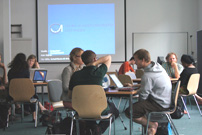
The video library was booked out most of the time
All films submitted to the festival could be watched at in the video library. As the 6 stations were not enough, many were using their own laptops sitting all over the place.
Additionally visitors and filmmakers were meeting here for interviews and intensive discusions.
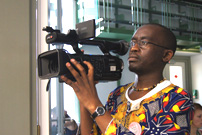
An event to remember
The filmmaker of "The nightmare of a Belief", Samuel Loe, was filming the event and put the film online.

An opportunity to interview
Many students not only interviewed the filmmakers present, but they also filmed the interview, thus experimenting with video too. Oliver Becker interviewing Klaus Betzl.
Students from Media History Studies (University of Siegen) used the festival for their own goals and put their report online here.
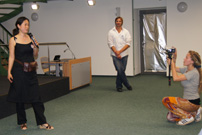
A never ending film project
Filmmaker Sachiko Tanuma asked Tina Krüger to film the discussion of her film as she plans to add these discussions to her film.
Thanks to many helpers
The festival is supported by the many helpers as there are the interns preparing the selection process, preparing the festival itself, running the festival office and the video library, attending the press, and most important managing the screening.
There also many students helping whereever help is needed in the cafeteria, in the entrance, and driving our guest from here to there.
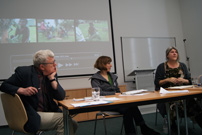
Finally: the symposium
One of the pressing question is always who does participate in the filmmaking how and when. During the symposium "Participatory - What 'Does it Mean? Participatory Cinema, Participatory Video Under Consideration" filmmakers, facilitators, and visual anthropologists discussed the various forms of participatory approaches clarifying the differences between participatory processes in filmmaking and participatory processes in applied contexts using video as a methodological device.
The symposium was funded by VolkswagenStiftung.
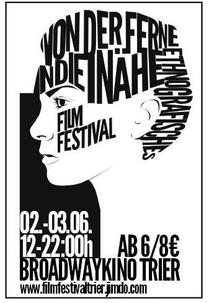
Von der Ferne in die Nähe
Ethnografische Filmfest Trier
Das Ziel dieses Festivals ist es, den Menschen die Besonderheiten des ethnografischen Films näher zu bringen und zu zeigen, wie die Menschen in verschiedenen Kulturen Leben, wie ihr Alltag aussieht und unter welchen politischen Bedingungen sie zu leben haben. Aus einer Vielzahl von Filmen wurden die Besten 14 Titel ausgesucht und haben den Einzug in das Programm des Ethnografischen Filmfestivals Trier geschafft. Unter dem Motto „Von der Ferne in die Nähe“, wollen wir Sie einladen, mit uns am ersten Juniwochenende auf die Reise zu gehen und diesen (Alltags-)Geschichten zu folgen, in einer Erzählform, die die üblichen „Menschen – Länder –Abenteuer“-Formate sprengt, die aber auch in besonderer Weise das Unvertraute nahe bringt, und ungewöhnliche Begegnungen ermöglicht. Wir freuen uns Ihnen diese Filme im Juni an unserem Filmwochenende vorstellen zu dürfen und begrüßen alle Interessenten ganz herzlich!
Travelling GIEFF
Since several years our festival films are travelling through out Germany and the world, very often they are shown at conferences or in seminars at the university, sometimes also at local cultural events.
If you are interested to organise a Travelling GIEFF please let us know: event@gieff.de
